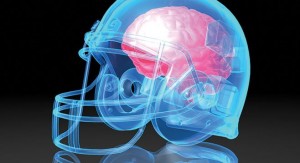 Public debate over the NFL’s proposed concussion settlement has reignited with the start of the 2014–15 season. Controversy over the League’s handling of the problem has been further fueled by the recent release of medical data, which details the long-term effects of the concussions received by professional football players. According to the report, which was presented to the presiding United States District Court judge in early September 2014, one in three professional football players will suffer from brain trauma at some point during their life. While the League agreed to lift their previous cap on the proposed settlement, which was set at $765 million, 214 retired players have asked to delay the opt-out deadline of October 14, 2014 and the fairness hearing scheduled for November 19, 2014 while their attorneys review the data.
Public debate over the NFL’s proposed concussion settlement has reignited with the start of the 2014–15 season. Controversy over the League’s handling of the problem has been further fueled by the recent release of medical data, which details the long-term effects of the concussions received by professional football players. According to the report, which was presented to the presiding United States District Court judge in early September 2014, one in three professional football players will suffer from brain trauma at some point during their life. While the League agreed to lift their previous cap on the proposed settlement, which was set at $765 million, 214 retired players have asked to delay the opt-out deadline of October 14, 2014 and the fairness hearing scheduled for November 19, 2014 while their attorneys review the data.
Concussion-Induced Brain Trauma
The release of the NFL’s analysis has been seen as an admission of the long-term health effects of concussions, a declining but still frequent occurrence in the game, after the League was criticized for a failure to warn players about the possible health risks of playing football. Pressure on the League to acknowledge the relation between football and brain damage accelerated after a number of affected retired players committed suicide, decisions suspected to have been influenced by their brain injuries and the subsequent onset of depression. The NFL’s actuaries, responsible for designing the model and drafting the report, anticipate that nearly 30 percent of all players will develop compensable diseases, suggesting that almost 6,000 former players will be eligible for compensation — of which only 60 percent are expected to file claims.
The analysts’ predictions are stark. An estimated 14 percent of all former professional football players will be diagnosed with Alzheimer’s, while another 14 percent will develop moderate dementia. Players younger than 50 have a 0.8 percent likelihood of suffering from Alzheimer’s or dementia, a significantly higher rate than the less than 0.1 percent risk associated with the general population. Similarly, former players between the ages of 50–54 have a 1.4 percent chance of developing a neuro-degenerative disease, while the general population faces a probability under 0.1 percent.
Brad Karp, one of the attorneys representing the NFL, suggested that the report overestimated the true rate of brain trauma development. According to Karp, this was done purposefully, with the intention of proving to the court that the proposed $765 million settlement would be sufficient to compensate players who currently, or will, suffer from chronic brain disease. However, according to Eleanor Perfetto, an epidemiologist and professor at the University of Maryland, the results simply confirm what the scientific community had already established years before — scientific evidence that concussions lead to increased risk of neurocognitive illnesses, that stretches as far back as the year 2000 (and that the NFL had originally attempted to deny).
Despite the League’s newfound acceptance of the relationship between concussions received while playing football and brain trauma, not all players are happy with the proposed settlement. Players who have developed less severe injuries are worried that the settlement will fail to compensate them. Furthermore, some players’ estates may not be compensated at all. The family of Junior Seau, a former NFL star who committed suicide in 2012, opted to withdraw from the settlement in an effort to pursue independent legal action for wrongful death, after the League informed them that the suggested deal won’t address the claims of heirs or successors. This may encourage other players and families to take a similar route, which may threaten the success of the proposed compensation package, Baseline Assessment testing, and treatment that many players now need.
Pope McGlamry: Leading NFL Concussion Attorneys
Suffering from repeated concussions while playing football can significantly increase the risk of developing severe neuro-degenerative diseases, including Alzheimer’s, dementia, and chronic traumatic encephalopathy. The attorneys at Pope McGlamry have led the battle to help players attain the compensation they deserve. If you have experienced a severe concussion and suffer from related trauma, contact our Atlanta law office to schedule your free case evaluation. You can contact Pope McGlamry at: (877) 285-7656.




